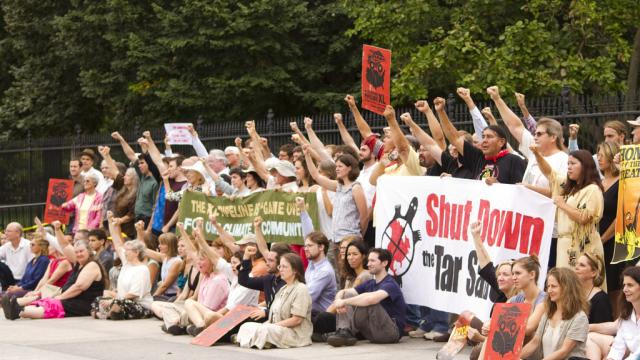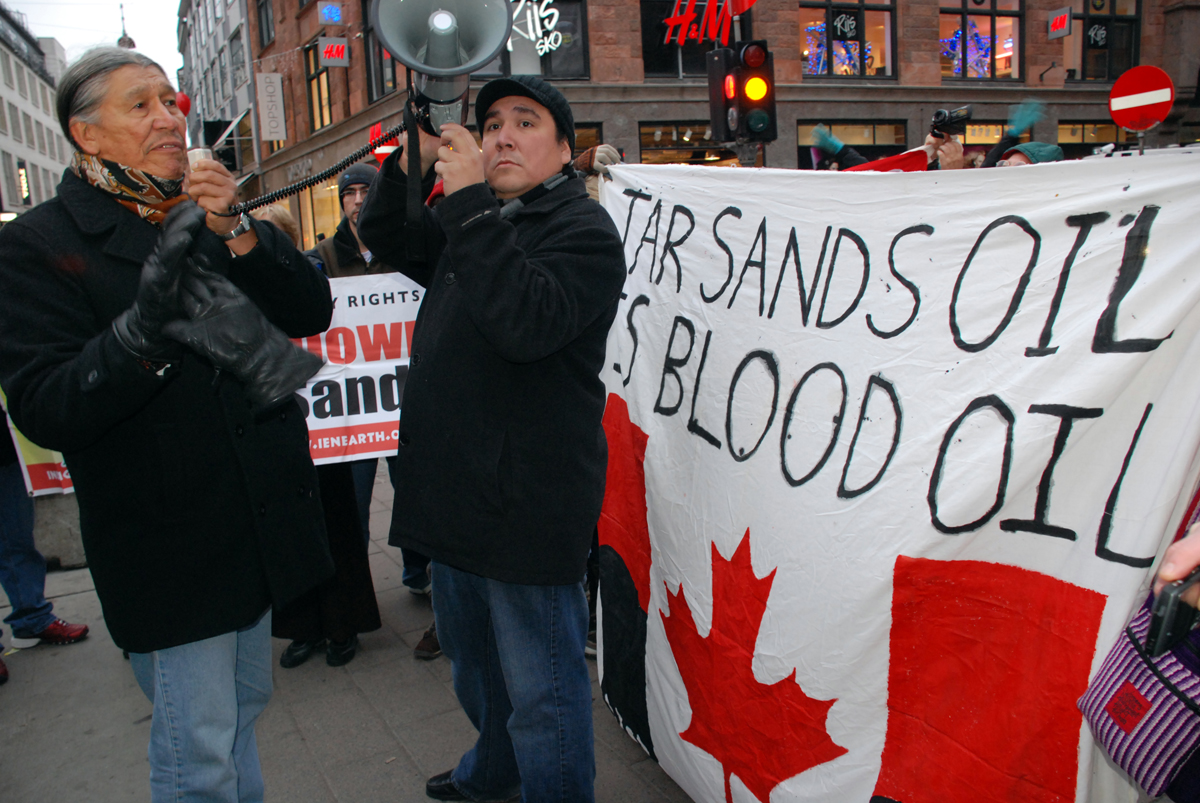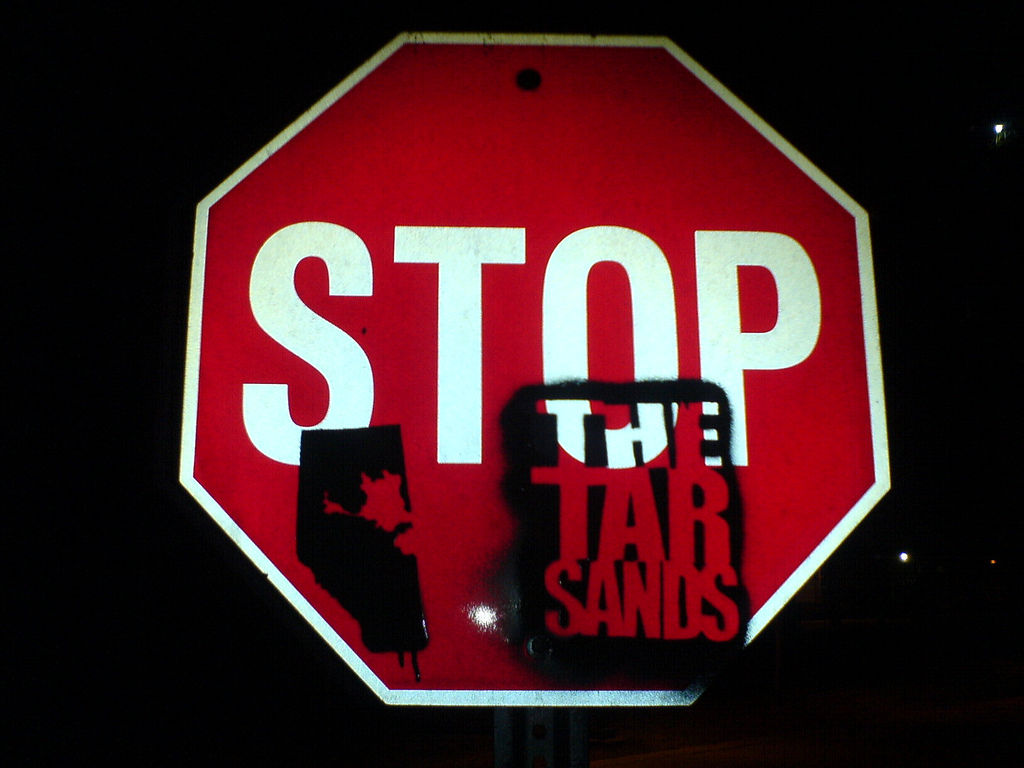
Canada’s expanding tar sands project sharply defines the parasitic form of capitalism resisted by the Occupy movement. To further humanity, we need transformation beyond a system based on infinite growth and over-consumptive resource dependency. Business as usual cannot continue.
One of the key priorities of the indigenous movement Idle No More is its resistance to the “most destructive project on earth”; fighting an undertaking so carbon intensive that eminent NASA Scientist James Hansen forecast its implementation will cause “game over for the climate.”
On a continental level, tar sands is accelerating destruction of Alberta’s boreal forest, polluting the second largest fresh water delta and killing the mainly indigenous people that rely on the water and lands for sustenance and life. Within global social justice, tar sands are not only a key battleground: the pan-humanitarian ideals resonating here provide a potential rationale to do away altogether with the parasitic form of capitalism as it exists today.
There are many similarities to austerity and the bailout dogma in the warped logic of dirty oil extraction and its toxic consequences. Tar sands, though, is worse: it is irreversible. By scraping the bottom of the barrel, the parasite is gorging beyond the physical capabilities of its host: planet earth.
Deep ecology, human rights and economic equality are arguably interdependent; I would argue that there needs to be greater recognition and common ground within the movements advocating for these things. The pan-indigenous symbiotic relationship within nature provides further connections. Vitally, it contradicts the values of consumption, which should be focused on more sharply in the fight against parasitic capitalism.
The search for dirty oil defines the parasite’s hunger
Idle No More co-founder Sylvia McAdam explained how the Canadian government’s recent legislation has dissolved swathes of ecological protection, in an interview on Occupy Radio LDN. The UK No Tar Sands Network reports that emissions by 2020 from this process will hit 104 MtCO2, which is the same as the combined current emissions for 85 less industrialized nations.
Since the legislation, Idle No More has exploded, as Occupy and the Spanish 15M movements did in 2011. These movements share focus against the spread of toxicity, whether it originates in expanding ecosystem devastation, our economic system or our corporate poisoned “democracy.”
McAdam expressed how the name represents a counter-move against acquiescence. This is a legal concept in Canadian Law, where consent is assumed if objections are not voiced. To reject parasitic capitalism – and tar sands – the globalized social justice movement should appreciate how we cannot just end acquiescence. And also, that those frequently oppressed are often complicit with the oppression of others.
Colonization globally enabled the wealth of European peoples. The annihilation of indigenous people in Canada’s colonization traces back to the late 18th century, with examples earlier too. British Commander Lord Amherst used biological warfare. Blankets given as “gifts” were purposefully dosed in the virulent disease small-pox, an act of genocide. A further example is the slave trade. Too extensive to mention, these incidents are not even confined to the past.
Complicity with death is wrapped up in objects considered everyday – including the laptop I write on. It probably contains columbite-tantalite from the Congo. There, like many places, the world’s throw-away rampant consumerism is causing resource conflicts, human rights violations and ecological ruin.
In accepting everyday complicity, the argument is not to engender guilt, shame or anger. After all, the system mainly suppresses the majority, benefiting just a few. In Great Britain for instance, the same drive for corporate development and endless growth running through tar sand’s justification also validates the banker’s bailout and austerity.
This means public spending provision cuts, increasing poverty – for instance Child Poverty Action reported that 27% of British children now live in poverty – and at worst this same systemic rational is killing people in Britain too. Examples include winter fuel deaths and disabled people, whose vital state support has been removed.
Despite the democratic deficit, due to corporate lobbying and media, public pressure still has influence. This needs to change: the public should have full power. To defeat the perpetuating aspects of parasitic capitalism – including the mainstream media, corporate lobbying and their econ-wash (economic greenwash) – a rationale needs to be pushed forward, simple enough that it cannot be easily distorted. It must also capture a populist mood-shift for change.
The unacceptable nature of parasitic capitalism may be clear to a large minority, but is clarified even further when viewed through the reality of tar sands. It shows we cannot continue like this. Linked as well to further global social justice is the simple argument that the globalized world, instead of annihilating indigenous peoples, needs to emulate some of their pan-humanitarian values. We need to move towards a symbiotic relationship with land, as indigenous people have shaped their lands, which in many cases are some of the richest remaining bio-diversities.
In short, parasitic capitalism destruction of indigenous people – particularly uncontacted tribes – applies the same rationale intrinsic within austerity and bailouts.
What started through colonialism has continuity now. Like a highly contagious sick patient, we need to end our toxic and immoral impact on indigenous peoples, those that are yet unaffected by our economic growth based on an ecological decline model. We need to kill parasitic capitalism before we interact with them: in the same way as a sick person may first have to accept that they are ill, then stay home to become healthy and not infect others.
Tar sands holds up a dirty mirror to capitalism
Deep connections between tar sands and austerity sharpen the argument it is a crucial battle. Patients dying in Greece, without healthcare provision due to austerity; or cancer deaths due to tar sands toxic pollution are both crimes against humanity. In terms of inequality, both the bailout and tar sands benefit the financial powers, with a disastrous impact on others’ access to vital resources. In the case of austerity, due to the economic fallout, in Britain the gap between the rich and majority has exploded to pre World War II levels.
Disregarding the democratic process and sovereignty is another issue that binds tar sands and austerity. In the case of Southern European countries, these measures are imposed by unelected and unaccountable authorities. This has eroded democracy to the extent that Goldman Sachs employees now are in controlling positions. One heads the European Central Bank, another has acted as un-elected Prime Minister of Italy and in Britain a third now runs the Bank of England. Tar sands similarly breaks agreed political laws. Treaties that Britain signed with first nation peoples are dishonored.
Conversely Britain’s shameful history gives it the power to be complicit no more, through the power it holds to sanction further atrocities. In the aforementioned interview Sylvia McAdam explained how the British Crown has an obligation to uphold first nation peoples’ rights to gain sustenance and live freely off the lands. These are being dishonored completely by the expansion of tar sands.
The short-termism of tar sands justification mirrors the bank bailouts. Two cornerstones of parasitic capitalism are debt and oil both fueling the economic model. Based on these inputs, the economy then – within its own logic – needs to keep growing. Both the banking bailout and tar sands stress the vital need to end these dependencies imminently: if not, society will have to pay an insurmountable return. In a finite world, the globalized consciousness also needs to realize that we must reject the notion that growth is good. We need enhancement not development.
Deregulation is also a core element of both aspects. The banking crisis occurred because of financial liberalization and the free flow of capital inspired and initiated by Thatcher and Reagan – whose ideas have unfortunately outlived them both. Tar sands too is the result of more recently legislated deregulation. Signed late last year, Bill C45 allows toxic water to flow into Canada’s waterways unchecked, like toxic assets spread by financial institutions such as Goldman Sachs.
The recent bailouts in Cyprus also explain something about parasitic capitalism’s inherent ruthless ambition, true similarly of tar sand’s expansion. In Cyprus there were proposals that those with savings in banks, even small amounts, were expected to pay money in the bailout deal. It seems in austerity Europe, the bankers will push the bailout gravy train further and further, setting new precedents for bankers in other countries.
Likewise, tar sands in Canada is a test case. If successful, it will inspire investors and oil companies to pump further money into planned tar sands operations in Jordan, the Republic of Congo, Madagascar, the U.S. and elsewhere.
Financially, a direct link can be drawn between the most destructive project and the bailout. At the height of the bailout, RBS was 84% owned by the British tax-payer; nevertheless they used this public money to invest into tar sands. This is representative of London’s financial sector as a whole: outside the American continent, British investors account for the largest backers of Canada’s dirty oil.
Earlier this year 18 top American scientists urged Obama to reject the expansion of tar sands and the Keystone XL pipeline, asserting it is against “planetary interests”. Austerity and bailouts is comparably against societal interests, not least when shown in its fullest extent, as in Greece. A curious further link here is with the area of deforestation of tar sands: Greenpeace report that it is now the same area as the austerity ravaged Southern European country.
Included with creating the second highest deforestation in the world, tar sands also creates massive tailing ponds. This is from the vast amounts of water that are used in its process. In austerity, Greece and other countries’ situation can also be blamed on the spreading of toxic subprime mortgage bonds. Investment banks such as Goldman Sachs traded and short sold these contaminated assets, according to a U.S. Senate Committee.
For activists fighting against tar sands, human rights violations and austerity – beyond the vital tactics of resistance: protest, divestment, boycotts and lobbying – attention also needs to target two further key areas. One is to advocate for alternatives. For instance a Crown Estate survey reports Britain could produce 20% of its electrical energy needs through tidal, whereas this alternative only currently receives a fraction of the oil industry’s investments and subsidies.
The other point relates to this. We cannot expect to replicate our current way of living. To move to a more equal and sustainable future, we need to use greener energy and less damaging ways of acquiring resources; crucially alongside using energy far more effectively and throwing away far less stuff. To inspire this transformation – again in rationale – there is a great deal the globalized society can learn from indigenous people.
Long before tar sands was even considered, one poignant first learning point was prophesied by an Odanaki First Nation. He said capitalism is “a depletion economy which leaves destruction in its wake. Your people are driven by a terrible sense of deficiency. When the last tree is cut, the last fish is caught, and the last river is polluted; when to breathe the air is sickening, you will realize, too late, that wealth is not in bank accounts and that you can’t eat money.” Hopefully it is not yet too late.
Tar sands resistance maybe the spark for a collective appreciation of this sentiment: it’s time to be complicit no more.
3 WAYS TO SHOW YOUR SUPPORT
- Log in to post comments


















